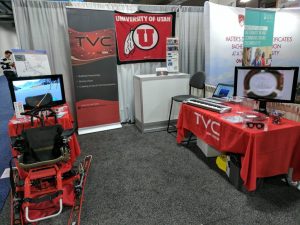Every January tech innovators, buyers, investors and press gather in Las Vegas for the annual Consumer Electronics Show (CES). Started in 1967, this year was the 50th anniversary of the influential tech gathering. Exhibitors from around the globe come to CES to display new products and ideas in what has become the largest show of its kind.
Most tech companies have representation on site and now universities do too. The U made their mark in the University Innovations area as they exhibited four exciting technologies developed by students and faculty. These tech marvels include:
 SENTINEL 100
SENTINEL 100
At the size of a credit card, Sentinel 100 is a board and chipset that enables engineers, operators and manufacturers to locate and detect critical faults in live-wire electrical systems when embedded in products. This technology works to prevent the shutdown of an electrical system and helps the operator pinpoint problematic areas. Additionally, Sentinel 100 can be used to predict outages by collecting baseline data for an electrical system. The technology was developed using the work of Cynthia Furse, Associate Vice President for Research and a professor in electrical and computer engineering.
TETRA UNIVERSAL CONTROLLER
The “sip and puff” system is an input method used by individuals with quadriplegia/tetraplegia to control mobility devices. When users sip from or puff into a straw, the change in pressure tells a computer to perform various functions such as moving a motorized wheelchair forward. Current technology is limited to only a few inputs, but the Tetra Universal Controller incorporates pattern recognition, timing and pressure intensity to provide almost unlimited control options. Through detailed sequences users can perform a greater number of tasks and increase their independence. This innovative technology opens new opportunities for individuals with quadriplegia/tetraplegia from household and office control to mobility. The Tetra Universal Controller even allows users to perform complex tasks such as kayaking or skiing. The developers of this technology are Jeffrey Rosenbluth, a professor of physical medicine and rehabilitation and medical director of the Spinal Cord Injury Acute Rehabilitation program, Ross Imburgia, a research engineer at the Division of Physical Medicine and Rehabilitation and Andrew Merryweather, a professor of mechanical engineering.
UPLAY PIANO
Uplay Piano is a web-based piano teaching program for children that allows them to take lessons through interactive online instructional software. Lessons are composed of stories, games, piano pieces and tests to cater to each child’s learning style. The program teaches children by introducing new concepts, teaching music theory, encouraging practice time and reinforcing previously gained knowledge. Students can hook up an electronic keyboard to interact with the program for a more realistic experience. Uplay Piano was developed by U faculty Lindsey Wright, an instructor at the School of Music, Susan Duehlmeier, a professor of music, and Cassandra Olsen-Taylor, an adjunct professor of music. Jared A. Pierce, a professor at the BYU School of Music and a U alumnus was also on the team.
ADAPTIVE GLASSES
Adaptive glasses are auto-focusing smart lenses. No matter the distance, in less than one-fiftieth of a second they automatically focus on what the user is looking at. Using a tiny laser and a small amount of electricity the liquid lenses provide a variable aperture controlled by an electronic actuator that compresses or stretches the lenses. These glasses remove the hassle of having multiple pairs of glasses. The developers of Adaptive Glasses from the U’s department of Electrical and Computer Engineering are Carlos H. Mastrangelo, a professor, Nazmul Hasan, a graduate research assistant, and Hanseup Kim, an associate professor.


